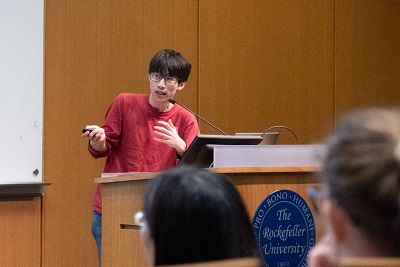Elizabeth Anne Heller
B.A., University of Pennsylvania
Synaptic Protein Profiling in the Mammalian Brain
presented by Nathaniel Heintz
Elizabeth Heller came to Rockefeller with an interest in molecular mechanisms of nervous system function, having graduated Phi Beta Kappa from Penn. Liz had been conducting behavioral studies of learning and memory, and wished to expand her experimental range into the fields of mammalian genetics and biochemistry. It has been my experience here that the best students, and Liz certainly qualifies here, should be left to their own devices a bit. In their pursuit of a project that is sufficiently important to satisfy their curiosity and ambition, they almost always choose to break down the experimental barriers that have failed to yield thus far. Of course, Liz being Liz, she took this to an extreme! She sought to address one of the most difficult biochemical problems facing us today: defining the nature of the biochemical code that distinguishes one connection in the nervous system from all others. This sounds rather simple doesn’t it? Just isolate the connections in question, called synapses, and determine their composition — no big deal! In fact, many laboratories have been working on this basic structure, identifying about 1,000 different proteins that are associated with it. So why bother?
Because, of course, there is a catch! You see, there are hundreds of varieties of these synapses, and information processing in the brain is dependent on maintaining these varieties and ensuring that they function properly. What Liz and her colleagues did was to develop an ingenious approach for studying the biochemistry of just one of these varieties at a time. This was no small feat, a bit like taking a ton of fruit salad and figuring out a way to isolate and savor the flavors of only that rare boysenberry sitting at the bottom of the bowl! Liz then took this approach, which we have referred to as synaptic protein profiling, and used it to provide the first biochemical glimpse of the elusive GABAergic synapse, demonstrating that its complex and critical roles in the brain are endowed to it by a relatively simple collection of proteins. As I hope you can appreciate from these comments, Liz has been instrumental in breaching a barrier that has faced our field for decades, and her studies are certain to stand tall among other efforts to understand the biochemical nature of synapse specificity.
In closing, I would just like to say to complement her deep intelligence, Liz is endowed with a tremendous sense of humor and a serious will to succeed. It has been a privilege for me to serve as her mentor, and it will be a pleasure to watch her as she becomes the scientific force that is her destiny. She is the only student for whom I have written a one-sentence letter of recommendation — which was a great success!
“I want you to know that if you do not interview Liz Heller and hire her, you are an idiot!”



